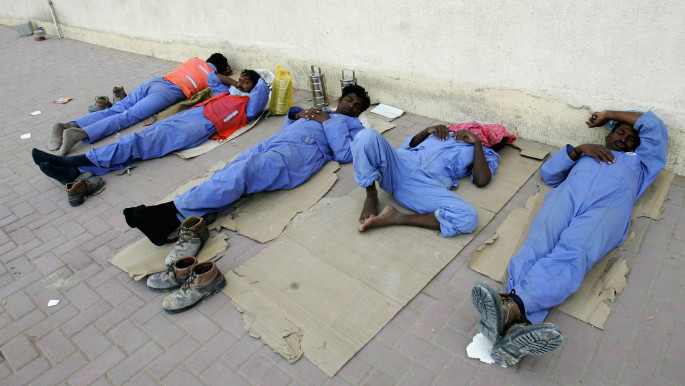UAE passes 'happiness charter', as happiness ranking slips
UAE passes 'happiness charter', as happiness ranking slips
The UAE's cabinet has approved a package of initiatives aimed at making residents happier, as the country slides down global happiness rankings.
2 min read
Dubai’s plan to become the world's happiest city has been dealt a blow [Getty]
The United Arab Emirates has passed a "happiness charter" to ensure the mental well-being and positivity of its citizens just days after the country slipped in global happiness rankings.
Prime Minister Mohammad al-Maktoum signed the national policy aimed at promoting "happiness, a positive lifestyle and government commitment" on Sunday, after last month appointing state ministers for the newly created ministries of happiness and tolerance.
"We are at the beginning of a path along which we are learning every day how to bring about prosperity and happiness for everyone. We want all people around the world to be happy," Maktoum said during a cabinet meeting.
The charter includes initiatives and services such as establishing councils of happiness and transforming customer service centres into "happiness centres".
The prime minister's latest move comes as the UAE fell in the annual World Happiness Report from 20th to 28th place out of 156 countries because of growing "happiness inequality", throwing a spanner into Dubai's plans to become the "world's happiest city".
The UAE's happiness project, which has recently introduced initiatives such as its own "happiness index" and a new minister of state for happiness, has raised eyebrows among observers - as it comes amid ongoing human rights concerns.
"The UAE often uses its affluence to mask the government's serious human rights problems. The government arbitrarily detains, and in some cases forcibly disappears, individuals who criticised the authorities, and its security forces face allegations of torturing detainees," said Human Rights Watch.
"A new anti-discrimination law further jeopardises free speech and is discriminatory, as it excludes references to gender and sexuality," the group added.
Last month, an Omani man was sentenced to three years in prison for "mocking" and "harming the reputation" the Gulf state using WhatsApp messenger by criticising the UAE's role in the conflict in Yemen.
In December, Jordanian journalist Tayseer al-Najjar was forcibly disappeared by security forces and is currently being held in solitary confinement in Abu Dhabi.
Prime Minister Mohammad al-Maktoum signed the national policy aimed at promoting "happiness, a positive lifestyle and government commitment" on Sunday, after last month appointing state ministers for the newly created ministries of happiness and tolerance.
"We are at the beginning of a path along which we are learning every day how to bring about prosperity and happiness for everyone. We want all people around the world to be happy," Maktoum said during a cabinet meeting.
The charter includes initiatives and services such as establishing councils of happiness and transforming customer service centres into "happiness centres".
The prime minister's latest move comes as the UAE fell in the annual World Happiness Report from 20th to 28th place out of 156 countries because of growing "happiness inequality", throwing a spanner into Dubai's plans to become the "world's happiest city".
 |
|
|
The UAE has been criticised for its treatment |
"The UAE often uses its affluence to mask the government's serious human rights problems. The government arbitrarily detains, and in some cases forcibly disappears, individuals who criticised the authorities, and its security forces face allegations of torturing detainees," said Human Rights Watch.
"A new anti-discrimination law further jeopardises free speech and is discriminatory, as it excludes references to gender and sexuality," the group added.
Last month, an Omani man was sentenced to three years in prison for "mocking" and "harming the reputation" the Gulf state using WhatsApp messenger by criticising the UAE's role in the conflict in Yemen.
In December, Jordanian journalist Tayseer al-Najjar was forcibly disappeared by security forces and is currently being held in solitary confinement in Abu Dhabi.

![Palestinians mourned the victims of an Israeli strike on Deir al-Balah [Getty]](/sites/default/files/styles/image_684x385/public/2024-11/GettyImages-2182362043.jpg?h=199d8c1f&itok=xSHZFbmc)


![The law could be enforced against teachers without prior notice [Getty]](/sites/default/files/styles/image_684x385/public/2178740715.jpeg?h=a5f2f23a&itok=hnqrCS4x)
 Follow the Middle East's top stories in English at The New Arab on Google News
Follow the Middle East's top stories in English at The New Arab on Google News


![Left-wing candidate Jill Stein campaigns in Michigan in October [Getty]](/sites/default/files/styles/image_330x185/public/2024-11/GettyImages-2176828619.jpg?h=199d8c1f&itok=h2FXzBuP)